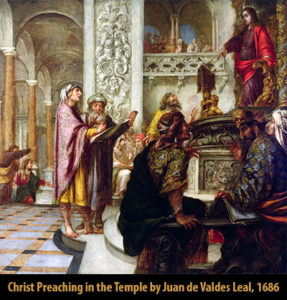And one of the scribes came up and heard them disputing with one another, and seeing that he answered them well, asked him, “Which commandment is the most important of all?” Jesus answered, “The most important is, ‘Hear, O Israel: The Lord our God, the Lord is one. And you shall love the Lord your God with all your heart and with all your soul and with all your mind and with all your strength.’ The second is this: ‘You shall love your neighbor as yourself.’ There is no other commandment greater than these.” And the scribe said to him, “You are right, Teacher. You have truly said that he is one, and there is no other besides him. And to love him with all the heart and with all the understanding and with all the strength, and to love one’s neighbor as oneself, is much more than all whole burnt offerings and sacrifices.” And when Jesus saw that he answered wisely, he said to him, “You are not far from the kingdom of God.” And after that no one dared to ask him any more questions. –Mark 12:28-34
I find myself frequently thinking about how to prioritize things. We have important things, favorite things, essential things, irreplaceable things and so on. There are things in our houses that, should we wake up in the night to find the place very much on fire, we would grab before we evacuated if possible. Most things we’d leave behind. There are also important things to say to each other. I’ve been extraordinarily helped in providing pastoral care to those wrestling with the complexity of human relations by learning the five things that may need to be said, which are often neglected for one reason or another: “I love you,” “I forgive you,” “Please forgive me,” “Thank you,” and “Goodbye.” They may come in different forms and may seem rather mundane, but are some of the most important things to say.
Jesus has been asked a string of questions in the temple: “By what authority do you do these things?” “Is it lawful to pay taxes to Caesar, or not?” “Whose wife will she be?” Now He is asked another: “Which commandment is the most important of all?” This is where prioritizing comes in. What is the most important thing to say here? There is a lot of Jewish law, and He knows it by heart, but chooses succinctly and poignantly.
Jesus is not offering a way to construct a code of personal ethics with His answer. He is talking about worship. How’s that, you ask? Notice how He begins the answer: “Hear, O Israel: The Lord our God, the Lord is one…” This is called the Shema from Deut. 6. Any Jew, even those who are nearly nominal in their religious practice, from Jesus’ day to ours prays this prayer regularly every day. It is worship. We are made in God’s image as symbol interpreters and symbol makers to direct the world, and that is most cultivated in worship. It can’t be half-hearted either (like showing up to covenant renewal worship at church less than most Lord’s Days!). It is about “love[ing] the Lord your God” with all your heart, all your soul, all your understanding, and with all your strength. That is to say: everything, all of you. That is what must be poured out gladly in worship of the Lord our God.
Now here’s the reason this is much more about worship than a code of personal ethics. If we were doing what Jesus says here, then the Kingdom of God has come. The Kingdom of Heaven or the Age to Come (there are various names for it) has come when the will of God is done on earth as it is in heaven. That looks like exactly what Jesus describes in His answer to the scribe: perfect worship of God with our everything. It’s been all about the Kingdom coming for Jesus so far, and that’s still the case here.
There is a second point. The scribe has not asked, but it’s too important for Jesus to let go: “‘You shall love your neighbor as yourself.’ There is no other commandment greater than these.” This means showing everyone the same respect and care that we show to ourselves. Again, this is about Eternal Life in the Kingdom: everyone will perfectly love each other as himself/herself.
This lawyer agrees with Jesus (we’re certainly not used to seeing that!), and discussion turns to “burnt offerings and sacrifices.” This is amazing because Jesus and this man are standing right there in the Temple complex agreeing that the centrality of the Temple is at best secondary to Jesus’ answer, and probably made void by it. Again, this passage is about worship and how worship will work now that the Kingdom is coming with Jesus’ teaching and presence. Jesus offers him some very good news: “You are not far from the kingdom of God.” The Kingdom of God is God’s new world, re-made on earth, thus it has a new way of worship.
The law of God is sweeter than honey at the honeycomb, it makes wise the simple, and to be more desired than much fine gold. Here we find that the law of God points us to His Kingdom where we will live that law forever and ever. And that’s the gospel.
